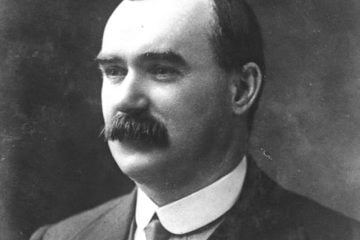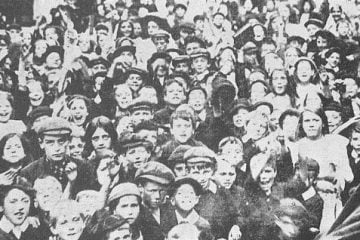Chapter One: Bourgeois and Proletarians
Summary
- History is defined, not by great individuals, but by struggle between classes.
- The modern ruling class, the bourgeoisie, is a product of the class struggle throughout history and this historical role that the bourgeoisie has played was to revolutionise the means of production through a capitalist economy.
o Veiled exploitation became clearer as wage-labour became the norm.
o National boundaries were dismantled.
o Political centralisation took place.
- But capitalism is now no longer capable of revolutionising the means of production because it is crippled by internal contradictions.
o Capitalism has developed the forces of production to such a high degree that the conditions of bourgeois society cannot contain them – i.e. it is possible to produce more than can be sold at a profitable rate on the market.
- Capitalism has also called into existence the proletariat – that class made up of people whose only possession is their capacity to work
o As capitalism crystallises these people into a class conscious of itself, workers form unions to fight for economic demands, which soon become political parties upon the realisation that all questions of class struggle are political questions.
o This process is not linear but moves in ebbs and flows with proletarian consciousness taking leaps forwards, followed by steps backwards depending on events.
- The bourgeoisie is no longer capable of ruling society and the time is ripe for proletarian revolution to overthrow capitalism and place the working class as the ruler of society.
o Unlike every previous revolution this would place the vast majority of people in power, as opposed to a small group or class that seeks to oppress the majority of society for its own interests.
Discussion questions
- What is the definition of ‘class’?
- Marx and Engels describe the bourgeoisie as having “played a most revolutionary role” but also say that “its existence is no longer compatible with society” and that it must be overthrown. What is the reason for this apparent contradiction?
- What is the definition of ‘proletariat’? How did this class come into existence? Why is it described as “the only really revolutionary class”?
- Consider Marx and Engels discussion of questions of globalisation, proletarianisation and economic crisis. To what extent are these predictions confirmed by today’s events?
Chapter Two: Proletarians and Communists
Summary
- Communists are not separate from the proletariat as a whole, they only distinguish themselves by highlighting the international elements of class struggle and by working to raise the political sights of the working class to the ideas of socialism.
- Communists argue for the abolition of private property i.e. abolition of exploitation of the proletariat by the bourgeoisie.
- Communists also point out that institutions such as family, education and nationality as we presently understand them are determined by the relations of production in society, i.e. by capitalism. A communist society would inevitably therefore see a fundamental change in these institutions.
- Communists seek to lead the proletariat to the conquest of political power and to centralise the instruments of production into the hands of the proletarian state.
- The rule of the proletariat in this way will lead to its own abolition as a ruling class and of class society generally
Discussion questions
- What is the relationship between Communists and the proletariat? Why do Marx and Engels emphasise this point?
- What do Marx and Engels mean when they say that “In bourgeois society, the past dominates the present; in Communist society, the present dominates the past”?
- Why do Marx and Engels say that all the institutions of society, from culture to marriage, will change when private property is abolished?
- Why do Marx and Engels think it possible to achieve a classless society under communism?
Chapter Three: Socialist and Communist Literature
Summary
- Feudal socialism is a reaction of the feudal ruling class against the rising bourgeoisie. It is reactionary in character and, if pushed, will side with the bourgeoisie against the proletariat.
- Petty-bourgeois socialism consists of an attempt by the middle layers of society to resist the march of capitalism and the proletarianisation of their professions. It is an attempt to hold back the wheel of history.
- German or “True” socialism appropriated criticisms of the bourgeois nature of the revolution in France in 1789 and applied them to revolutionary movements in Germany. Since Germany had not at that stage had a bourgeois revolution, these criticisms, dogmatically copied from France, served as an argument for maintaining the status quo instead of supporting revolution.
- Bourgeois socialism is that brand of socialism that would like to solve social problems so as to maintain the existence of capitalism. Naturally this is a contradiction that cannot be resolved and so is an idealistic, utopian and therefore reactionary set of ideas.
- Utopian socialism sees the failures of capitalism but cannot yet see a class that can resolve them, leaving the ideas of utopian socialists without a basis in the real world.
- Communists support all revolutionary movements against the existing order of things and bring to the fore in these struggles the property question as the most important factor.
Discussion questions
- How does this chapter answer the criticism of Marxism as “utopian”?
- To what extent would Marx and Engels agree with the statement that “communists can compromise on tactics but never on principles”?



